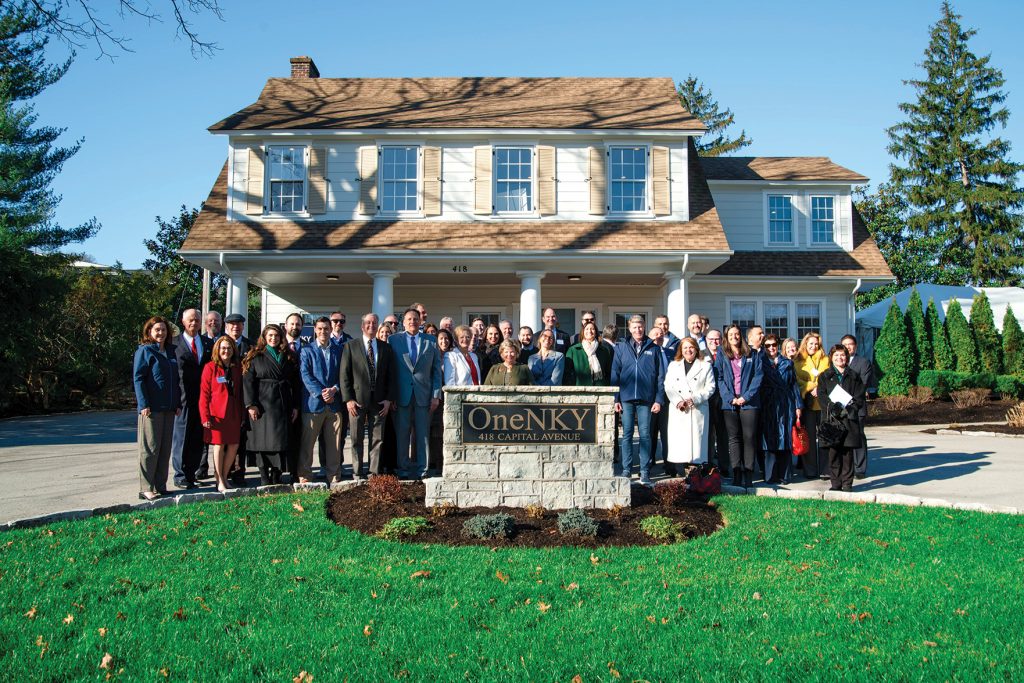The life sciences sector in Northern Kentucky has been a growing source of jobs and investment, driven by expansions of young tech startups in the biomedical research and gene therapy space as well as by big companies like St. Elizabeth Healthcare. The growth in jobs was exponential, doubling between 2015 and 2020. But overall employment in the sector is still relatively small compared to more traditional NKY employers such as logistics and manufacturing.
So a couple years ago leaders of three life sciences companies agreed on an idea to catalyze growth in the sector and attract more high-paying jobs and investment: Develop a large, shared laboratory that would serve as a life science research and development center and could accelerate momentum in the field locally by attracting more startups, entrepreneurs, and research to the region.
Today, less than three years after that idea was first hatched, a 10,000-square-foot laboratory is under construction in Covington, launched with the help of $15 million in state funding. The responses from Covington’s leadership, the region’s state legislative delegation, and the governor have been credited with moving the project from idea to action in that relatively short period of time. “It’s had the involvement of corporate leaders both inside and outside the life sciences sector in Northern Kentucky,” says Tom West, Covington’s economic development director.
The research facility is an example of why learning to navigate the halls of power, or getting help to do so, is an essential part of doing business. “It’s extremely important,” says Karen Finan (pictured above), president and CEO of OneNKY Alliance, an organization of CEOs and other Northern Kentucky business leaders who work toward a shared regional agenda. “There’s the community will to have these initiatives accomplished, but the people who can make it happen are the legislators, the policy makers, and the elected officials.”
People who live, work, and run businesses in Northern Kentucky and Southwest Ohio sometimes consider themselves to occupy forgotten corners of their states, removed from the legislative action hundreds of miles away in Frankfort and Columbus. But they can get help maneuvering through the sometimes confounding legislative arena from organizations like OneNKY Alliance.
In Northern Kentucky, Finan says, “You can talk all day long about being the stepchild in the Commonwealth, but at the end of the day we have wonderful assets right in our backyard that we are responsible as a community to leverage and to grow. We’re responsible for being the best version of ourselves.”
The life sciences lab concept came about when three key Covington-based companies began brainstorming how to expand momentum in the region’s growing biotech and health care sectors. CTI Clinical Trial and Consulting Services is a 25-year-old contract research organization that manages clinical trials and other research needed to bring new drugs to the market. Its global headquarters is in the RiverCenter II tower on the Covington riverfront, and it employs people in more than 60 countries. Bexion Pharmaceuticals is developing a drug that’s shown promise in destroying brain tumors and other cancers. Gravity Diagnostics started in 2015 as a small lab, then grew fast as it responded to the urgent need for processing COVID-19 tests.
A meeting among the three companies in 2021 with Covington Mayor Joe Meyer focused on what was needed to build on the growing energy of the life sciences sector in Covington and the broader region. The group landed on the need for equipped lab space that new and emerging companies could rent, a “wet lab” equipped with plumbing and ventilation for hand-on scientific research that could also serve as a place where scientific minds might meet and collaborate. As discussions evolved, a meeting between Gov. Andy Beshear and CTI Chairman and CEO Tim Schroeder sparked the governor’s interest, and he promised his support.
“For Kentucky to remain competitive for the jobs and industries of the future, we need a new research facility in Northern Kentucky that can support the many life sciences and biotech companies already in the region,” Beshear said in announcing the state’s intention to back the project. “It would also draw new innovators and startup companies, creating more high-wage jobs and cutting-edge treatments right here in the Commonwealth.”
In early 2022, Beshear included $10 million for the project in his recommended budget, and Covington hired a lobbyist and joined the three companies and other partners in advocating for the project with Northern Kentucky’s statehouse delegation and all of Kentucky General Assembly’s 138 members. In the end, the Legislature actually added $5 million to the governor’s request for a total of $15 million in state funding. “In my opinion, the project would never have gotten off the ground without that initial outreach,” West says.
In Northern Kentucky, approaching the Legislature and other policy makers with one voice has become an important strategy for meeting community goals. Regional leaders took a big step toward doing that when they formed the OneNKY Alliance in 2017 to identify an agenda and act with a unified voice to achieve it. “Northern Kentucky is three counties, 36 cities, 14 school districts, and a number of fire and police departments, and it all lends itself to fragmentation,” Finan says. “We feel like there are some fundamental building blocks now in place that allow us to speak with one voice when it matters.”

In 2020, OneNKY established a physical presence in the state capital when it opened its OneNKY Frankfort building. Located within walking distance of the Capitol itself, the former residence was renovated to include meeting space and conference rooms, giving Northern Kentucky organizations and businesses a place to convene, strategize, and meet with legislators and other state officials.
“We said, We must be present to win, so how do we tackle this?” Finan says. “Since we opened, we’ve had hundreds of receptions and strategic meanings and gatherings. It’s a place for our community to come together in Frankfort when they’re visiting the Capitol or have business with other policy makers in and around Frankfort.” The center came about through support from St. Elizabeth, Corporex, Fischer Homes, and other corporations and nonprofits.
Last December, OneNKY Alliance hosted a reception there to celebrate the inauguration of Beshear’s second term. More than 100 people attended, as the inaugural parade route ran directly past the center and guests could walk to the ceremony itself.
Another visible success for the Alliance is the OneNKY Center, a 45,000-square-foot Class A office building now under construction at the foot of the Roebling Suspension Bridge in Covington. It will house several organizations focused on the growth of the region, including OneNKY Alliance, Northern Kentucky Chamber of Commerce, the convention and visitors agency meetNKY, economic development organization BE NKY Growth Partnership, the financing organization Catalytic Fund of Northern Kentucky, the philathropic Horizon Community Funds of Northern Kentucky, and the Northern Kentucky Bar Association. It will also house the life sciences lab and Covington Life Sciences Partners, the organization that will oversee it.
Beshear and local officials conducted a ceremonial groundbreaking for the project in August 2023. “The OneNKY Center represents a tremendous amount of collaboration among the Kentucky General Assembly, the governor, and the business and elected leaders within the Northern Kentucky community,” state Senator Chris McDaniel said at the time.
A number of Southwest Ohio organizations deal with the state legislature regularly, including the Cincinnati Business Committee, the Cincinnati Regional Business Committee, and REDI Cincinnati. Business leaders can tap into the Cincinnati USA Regional Chamber, which has organized a government affairs and advocacy group that works with members to annually set priorities for a policy agenda, says Liz Keating, a former Cincinnati City Councilmember who was hired in February as the Chamber’s vice president of government affairs and advocacy.
The Chamber’s 2023 policy agenda included protecting funding for small-business programs, workforce programs, public transit and local infrastructure, and advocating for legislation to help Ohio build its population and its future workforce. “Our businesses and our leaders are focused on running their organizations and don’t necessarily have all the time in the world to read every single policy that is coming out of the state,” says Keating. “That’s where we come in to keep everybody engaged and up to date on what’s happening.”
Private consulting firms also make it their business to know the legislative environment and stay current on what’s happening. One is DSD Advisors, an affiliate of Dinsmore law firm. Matt Davis, who served in government affairs roles in both the Cincinnati and Northern Kentucky chambers, started the office in 2014. “Folks who do what we do understand the process,” he says. “We can help set the strategy for how to get there. We understand and have relationships with policy makers.”
In some ways, he says, lobbyists and consultants are like the Himalayan mountain people who guide others to the summits. “We’re kind of like Sherpas,” says Davis. “We start at the mountain’s base camp, and we want a strategy that’s hopefully a straight line up to the top. It’s always going to zigzag, and sometimes we’re going to go backwards, but we’ve traveled that road before and we can help people through it.”

That isn’t a bad way to describe Davis’s work with Beemok Capital, the private company that bought the Western & Southern tennis tournament in 2022. Davis represented the Charleston, S.C.-based firm as it sought financial support from local and state governments in Ohio to help realize its plans to expand the Masters-level tournament and the tennis center in Mason that hosts it. Mason, Warren County, and Ohio were in competition with political and business leaders in Charlotte, N.C., which was thought to have the inside track on landing the internationally known tournament under its new owner.
“It became a competitive situation and we worked to bring everybody together—state government, local government, county government, the business community—to try to put together a proposal and a set of conditions that would keep them here in Cincinnati,” says Davis.
Cincinnati corporate leaders worked with local officials in Mason and Warren County, with local economic development offices, and with state legislators, including Lt. Gov. Jon Husted, to put together an economic package to compete with what local and state leaders were proposing in North Carolina. After the city of Mason and Warren County agreed to significant financial contributions, the state’s participation became critical as the clock ticked for Beemok Capital to make a final decision.
Husted met with Beemok’s principals and local leaders at the Mason tennis center to hear about plans for tournament and facility expansion. State Rep. Adam Mathews, a freshman legislator from Warren County, worked the corridors of the Statehouse to get funding for the tournament included in the state budget. Meanwhile, in North Carolina, state funding there was held up in legislative fights over other issues and ultimately fell short. Ohio, Greater Cincinnati, Warren County, and Mason were able to secure the tournament with a 25-year deal.
A process like that can be complicated, even though everyone agrees on the goal. “How you get there is often where things get bogged down,” says Davis. “So you have to know the players and understand the motivations and then chart the best path forward, bringing as many people along as you can.”
He also worked on the sale to Norfolk Southern of 337 miles of rail line owned by the city of Cincinnati (read more about the sale here). Representing the Atlanta-based railroad in that effort was a complicated process that involved negotiations with the Cincinnati railway board that oversees leasing the key rail line, Cincinnati’s mayor, and City Council, lobbying for a change in the 19th century state law governing the rail line, and ultimately a campaign to win over Cincinnati voters, who had the final say. They approved the sale in November. The overall process took well over two years.
“Trust had to be built among the city of Cincinnati and the state legislature to come up with something that not only works for the citizens of Cincinnati but also harmonizes with Ohio law and makes sense,” Davis says.
Davis has worked with large and small businesses on matters large and small and says most will need government relations expertise at some point. “People sometimes view the need for being involved in the public policy process as something that kind of exists on the side until it hits them right in the face and they’ve got to deal with it,” he says. “And they’re left scrambling with a set of factors that they probably haven’t thought of and dealt with before.”
He often asks clients and prospective clients about the two or three issues that keep them awake at night. “Usually, the majority of the things that keep them up at night have a public policy solution to them,” he says. Those can be tax or regulatory issues or something as seemingly small as requesting a new curb cut for a retailer.
In more than a dozen years working on issues at the Ohio Capitol, Davis has heard the complaint that Cincinnati and Southwest Ohio don’t get enough love from Columbus. But he doesn’t see it that way. “I do hear that,” he says. “But you’ve got to get engaged, you’ve got to be involved, you’ve got to build relationships. You can’t just sit inside of I-275 and not tell your story.”


